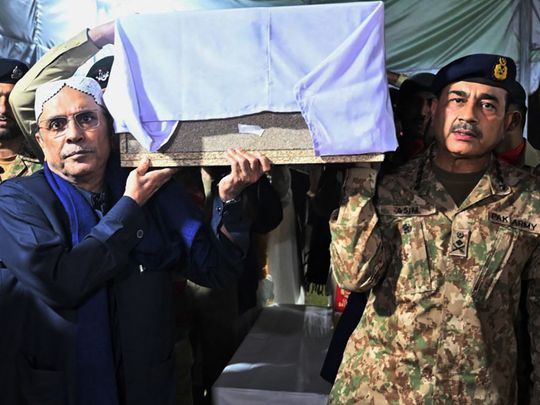
KABUL: Pakistani airstrikes targeted multiple suspected hideouts of the Pakistani Taliban inside neighbouring Afghanistan early on Monday, killing at least eight people, all women and children, two days after insurgents killed seven soldiers in a suicide bombing and coordinated attacks in a northwestern region, officials said.
The Afghan Taliban government denounced the strikes, which are likely to further increase tensions between Islamabad and Kabul.
In a statement, the Taliban defence ministry said it had targeted Pakistani troops at the border in response to the air strikes.
According a Pakistani security official and an intelligence official, the airstrikes were carried out in Khost and Paktika provinces bordering Pakistan.
The officials provided no further details. They spoke on the condition of anonymity because they were not authorized to speak to the media.
There was no immediate comment by Pakistan’s military. The Pakistani Taliban — a separate militant group but allied with the Afghan Taliban — also confirmed the strikes, saying the attacks killed several women and children.
It was not immediately clear how deep inside Afghanistan the Pakistani jets flew. The airstrikes were the first since 2022, when Pakistan targeted militant hideouts in Afghanistan. However, Islamabad never officially confirmed those strikes.
Separately, in January, Pakistani strikes — in a tit-for-tat exchanges with Tehran — hit Pakistani militants inside Iran.
Violation of Afghanistan’s sovereignty
Chief Afghan Taliban spokesperson Zabihullah Mujahid said in a statement that Pakistan’s airstrikes on Monday killed three women and three children in the district of Barmal in Paktika province while two other women were killed in a strike in Khost province.
“Such attacks are a violation of Afghanistan’s sovereignty and there will be bad consequences that this country will not be able to control,” Mujahid said.
On Saturday, seven soldiers were killed when suicide bomber rammed his explosive-laden truck into a military post in the town of Mir Ali, a town in Khyber Pakhtunkhwa province that borders Afghanistan. Troops responded and killed all six attackers in a shootout, the military said.
Pakistani President Asif Ali Zardari attended the funerals of the soldiers and vowed to retaliate for their killings, saying “the blood of our martyred soldiers will not go in vain.”
Saturday’s attack on the military post was claimed by a newly formed militant group, Jaish-e-Fursan-e-Muhammad. However, Pakistani security officials believed the group is mainly made up of members of the outlawed Tehrik-e-Taliban Pakistan or TTP, which often targets Pakistani soldiers and police.
Mohammad Ali, an Islamabad based security expert, said Monday’s strikes were in retaliation for a series of TTP attacks, especially the one on Saturday in Mir Ali where an army lieutenant colonel and a captain were among those killed.
Ali said the Pakistani strikes came within 24 hours of Zardari’s promise of strong retaliation.
“It also indicates that Pakistan’s patience for the Afghan interim government’s continued hospitality for terrorists conducting frequent attacks on Pakistan from inside Afghanistan has finally run out,” he said.
The Afghan Taliban seized power in Afghanistan in 2021 as the US and Nato troops were in the final stages of their pullout after 20 years of war. The Taliban takeover in Afghanistan emboldened the TTP, whose top leaders and fighters are hiding in Afghanistan.
Though the Taliban government in Afghanistan often says it will not allow TTP or any other militant group to attack Pakistan or any other country from its soil, the Pakistani Taliban have stepped up attacks inside Pakistan in recent years, straining relations between Kabul and Islamabad.












